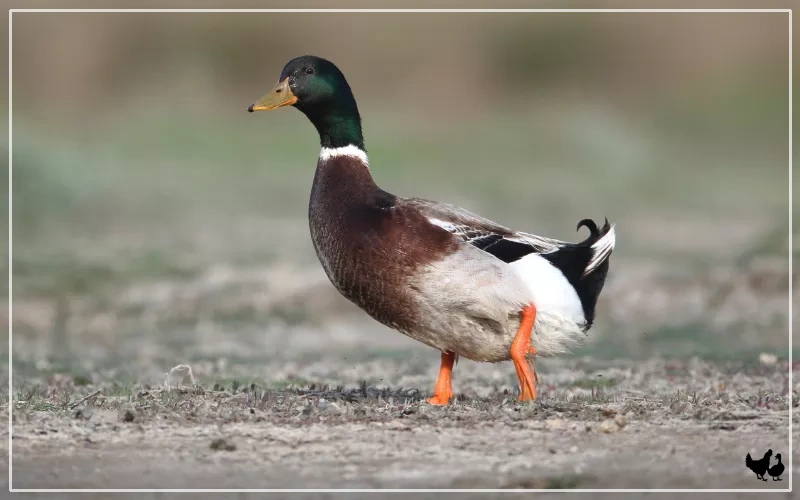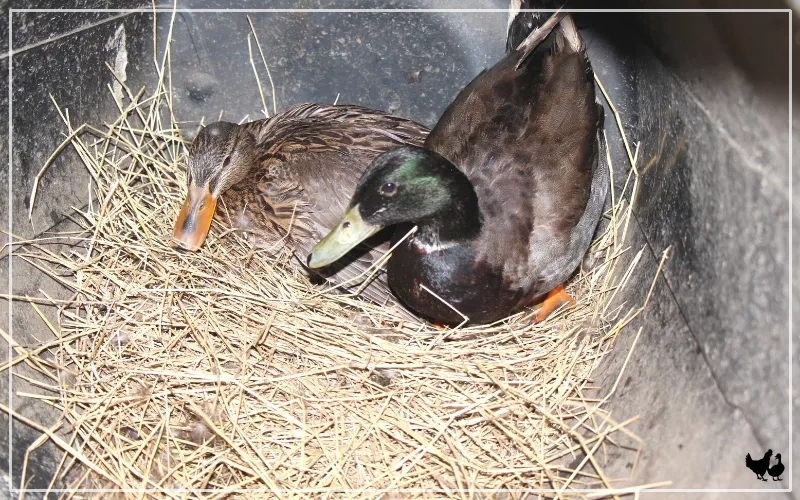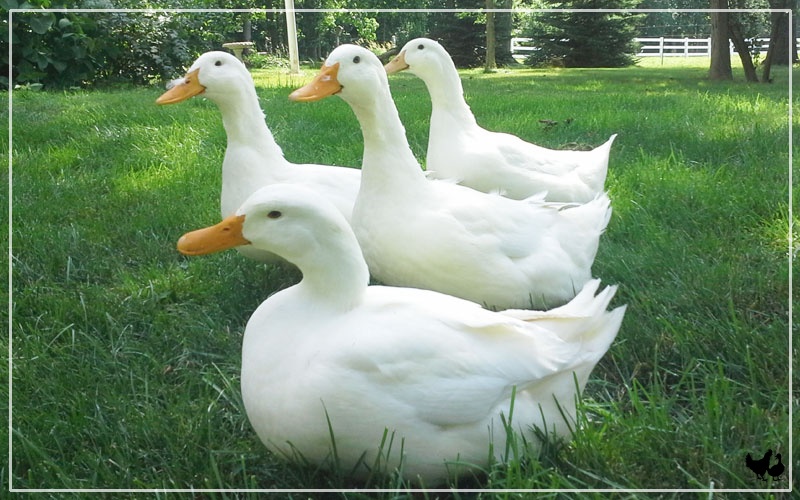Rouen Duck – Breed Profile & Facts
Typically raised for their meat, Rouen ducks are also suitable for being raised as a pet or for exhibitions. Originating from France, the Rouen duck was included in the American Poultry Association (APA) Standard of Perfection as early as 1874.

Undoubtedly, this duck breed is similar to the Mallard breed, but it’s a breed on its own, distinguishing itself from the Mallard through several physical characteristics.
If you want to learn more about the Rouen Duck breed, in the following breed profile I will cover everything you need to know about the characteristics and care requirements of this breed.
What are Rouen Ducks?
A heavy breed of domesticated duck, the Rouen Duck is thought of as a general-purpose duck, although it’s not a prolific egg-layer.
The color pattern of the plumage is eerily similar to that of the Mallard, but there are several distinctions including that the Rouen females are much darker than Mallard females. Plus, adult Rouen Ducks are significantly larger than Mallards.
Male Rouen ducks have dark, ashy brown feathers, green heads with a white collar on the neck, as well as black tail coverts. Females of the breed feature mahogany brown plumage, brown crown, and tan eye-stripes. Blue speculum feathers are present on both drakes and hens.
When comparing ducklings, it’s more difficult to distinguish Rouen ducklings from Mallard ones. But upon a closer inspection it becomes obvious that the Rouen ducklings have a second stripe that runs across their faces, specifically under the eye, while Mallard ducklings have a single stripe, which runs across the eye.

Rouen Duck Characteristics
From their size to their temperament, I cover all the important characteristics of Rouen ducks below:
– Size & Weight
Described as a heavy weight domestic duck, the Rouen breed comes in two varieties – the Standard-bred and the Production-bred.
The Production Rouen is on average two pounds less than the Standard-bred variety, which can reach a whopping 9-12 lbs (4.1-5.4 kg).
– Temperament
Docile and easygoing, Rouen ducks have a good temperament and they’re a suitable companion for other types of poultry. You can keep these ducks even as a pet.
There’s only one case in which a Rouen drake can become a bit aggressive – when guarding the nest of a hen. They will try to attack anything or anyone who tries to approach.
Other than this, they’re calm ducks that are often described as lazy even. Some of that laziness, however, may have to do with their large size, making it hard for them to move more swiftly.
They’re also the quiet kind of ducks that will not become a nuisance for your neighbors. These qualities make the Rouen duck breed suitable to be raised as decorative birds or as pets.
– Lifespan
If you’re not raising Rouen ducks for their meat, you’re probably interested in the life expectancy of these ducks.
A Rouen duck that’s well taken care of can be expected to have a lifespan of 8 to 12 years. Life expectancy is influenced by a variety of factors including genetics, diet, and environment.
To extend the lifespan of a Rouen duck, make sure it’s up to date on its vaccination. Regular deworming and health monitoring are just as important as a healthy diet.
– Egg Production

If you want to raise ducks for egg production, Rouen ducks should not be your breed of choice. They’re simply not reliable egg layers.
Some Rouen hens can lay up to 125 eggs per year, but most will lay only 35-50 eggs per year. Given that other duck breeds like the Campbell duck can lay as many as 340 eggs per year, Rouen ducks should not be considered for egg production.
The eggs that Rouen ducks lay are white or occasionally green or blue. Beyond the fact that these ducks lay fewer eggs than many other breeds, Rouen hens also tend to crush the eggs when sitting on them because of their heavy bodies.
Another disadvantage when it comes to egg production is that this breed takes a long time to mature for egg-laying purposes. It can take as many as 10 months for a Rouen hen to start laying eggs.
Supposing that the hen doesn’t crush the eggs while incubating them, it takes about 4 weeks for the eggs to hatch.
– Meat Production
Rouen ducks may be bad egg-layers, but when it comes to meat production, they seem to be an ideal choice.
Despite taking around 8 months for them to be table-ready, the Production-bred Rouen is a great choice for meat. The meat is delicate and perfect for roasting.
The meat is also delicate in terms of flavor, which some might prefer over the more flavorful duck meats.
Despite being a meaty duck breed, the fact that they mature slowly, doesn’t make them ideal for commercial mass-production. But they’re ideal for small farms.

Rouen Duck Care
Now that you know what makes a Rouen duck a valuable breed to raise, let’s see what its needs are and how you can give this breed the best care.
– Feeding & Nutrition
As waterfowls, Rouen ducks need access to a pond not only for swimming but also for feeding on aquatic animals like small fish, snails, and crabs but also aquatic plants.
Other than this, Rouen ducks will also forage for insects and larvae and pupae found under small rocks. Beyond these, their diet should also include commercially available duck feed or pellets.
Free range time, which allows the ducks to forage and feed on grasses and various plant materials is also essential.
Other than these, chopped vegetables and fruits can also be offered to them.
– Housing
Rouen ducks aren’t very cold hardy, nor can they be left outside during frost. In winter, they need a warm coop that’s draft-free. They don’t need a heated coop, however.
Aside from protection from the elements during winter, they also benefit from a shelter during other seasons including summer, when they should be provided a cover to protect them from direct sunlight during the hottest parts of the day.
You don’t need to worry about having tall fences as they’re not capable of flying away. But do offer them a space, where they’re protected from predators.
Offering them access to a pond, fresh drinking water, and free-range time should also be factored into your housing plans.
– Health Problems
A generally healthy and hardy breed, Rouen ducks can be prone to some diseases like bumblefoot due to their heavy size and large legs.
To prevent the disease from becoming dangerous, regularly check the pads of their feet for any abscesses and treat any problems that arise.
Another important thing to do is make sure your Rouen ducks are up to date on their vaccination. Regular deworming is also needed.
Having access to a pond is also a health necessity. The fact that ducks can bathe will ensure that they’re protected against mites, fleas, ticks and other such parasites.
Without access to a pool or other water source, ducks can also develop ‘wet feather’ disease, which is caused by a clogged preen gland.
How Much do Rouen Ducks Cost?
The cost of Rouen ducks is influenced by a couple of factors including gender and age. Females are usually more expensive, while chicks are cheaper.
The cost of a drake is around $8, while a female Rouen duck can go for as much as $15. Of course, the price per duck can be driven down if you buy large quantities.
Rouen ducks are one of the most popular duck breeds in North America, so there are plenty of breeders that raise them. Sourcing them is easy, but make sure you still buy from a reputable breeder.

Are Rouen Ducks Good for Beginners?
The Rouen breed can be a good choice for beginners. After all, they’re just as easy to care for as any other duck breed, they’re docile and even less noisy than other popular duck breeds.
It also depends on what your purpose is. If you want to raise them for their meat, you might not be happy with the fact that it can take a while for them to become table-ready.
Raising them for their eggs is not ideal, since they take a long time to mature, and even when mature for egg production, the number of eggs they lay in a year leaves a lot to be desired.
But as a pet bird or a show bird, Rouen ducks are ideal. Even for meat production on a small farm, they can be an excellent choice.
Are Rouen Ducks Hardy?
Rouen ducks are described as hardy ducks in that they’re not more prone to health issues compared to other ducks. Therefore they don’t need any specialized care.
They’re not more cold-hardy than other breeds but they also get by without too much fuss during the winter. A simple coop that protects from frost and draft is enough for them.
If they have access to a pond, free range time, and a healthy diet, they can live for a very long time without any health problems.
Can Rouen Ducks Fly?
No, a Rouen duck cannot fly. These are flightless ducks in part because of their heavy constitution, but also because their wings and feathers are not developed for taking flight.
But Rouen ducks aren’t the only domesticated ducks to be flightless; almost all domesticated ducks have lost their ability to fly, except for a couple of breeds like Muscovies, Calls, East Indies and domesticated Mallards. But even they only fly to some extent for short distances.
Tips on Keeping Rouen Ducks
To successfully keep Rouen ducks on your property, here’s a quick checklist of things you need to make happen:
- Access to a pond or pool for exercise and bathing.
- A healthy diet and the possibility to forage for insects (e.g. during free range time).
- A warm coop during winter to protect from the elements and cover during summer to protect from the heat.
- Regular vaccinations and deworming.
- Regular health monitoring.
Conclusion
The Rouen duck breed is among the most popular breeds in Northern America. They’re loved for their docile and easygoing nature.
Rouen ducks are also among the quieter ducks to keep on your property, which can be a big plus when it comes to neighbors.
They’re suitable for meat production in small quantities and make excellent decorative or pet birds.



